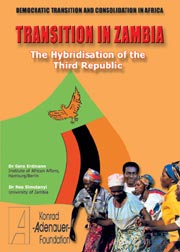Einzeltitel
Preface
Since the Third Wave of Democratisation broke along African shores, many books and articles have been written about the particular transition processes.
Nevertheless, ten years down the line there is still a lack of comparative research on a sound methodological basis and a deficit in elaborate case studies. The Konrad-Adenauer-Stiftung (KAS) – a German political foundation – in 2002 started a series of assessments on democratisation processes in sub-Saharan Africa. On the basis of a common set of questions, the state and problems of democratic transition were analysed in order to enable a cross-country comparison. A first set of studies started in 2002 and covered Zimbabwe, Kenya, Nigeria and Burkina Faso. In 2003 the number of case studies was extended to Malawi, Mozambique and Zambia. Decisive for the selection of the case studies became their defunct character of the democratisation process. In all seven countries the democratic transition process was either never successfully accomplished or was, after a very promising beginning, sooner or later reversed. To some degree the countries’ democratisation processes can even be labelled an “extended process of transition”.

The comparative approach of the study aims to highlight differences in the democratisation processes as well as to identify commonalities and roots for the problems ncountered. Besides, the qualitative analysis attempts to provide an academic foundation for the development of adequate policies in support of democracy in Africa in general and for KAS in particular.
The seven case studies were conducted by teams of German and African scholars; the latter originating from the country under review. As a qualitative measurement of democracy, the studies are based on personal observations, approximately 200 interviews and secondary sources that also encompassed empirical data gained from various surveys.
Drawing on the paradigms of democracy by Robert A Dahl and Larry Diamond, the analyses focus on political competition and participation, civil and political rights, political and civil pluralism, the rule of law, and checks and balances. Additionally, the studies address aspects of political culture and the behaviour of key actors. In order to avoid the shortcomings of a mere assessment of the status quo which would fall short of identifying underlying causes for obstacles in the democratic consolidation, the analyses emphasise the process character and take into account developments within the transition process and historical legacies that still might have an impact.
In the case of the present Zambia study, the research team comprised Dr Gero Erdmann and Dr Neo Simutanyi, both scholars widely acknowledged for their in-depth analysis of Zambian politics. On behalf of KAS we would like to thank Dr Erdmann and Dr Simutanyi for their dedication and excellent cooperation during the project period.
The present analysis comes at a time when Zambia is moving to another crucial stage of its democratisation process. In the early 1990s Zambia set an example when it brought down an authoritarian single-party state in a peaceful manner and adopted a new constitution upholding human rights and a democratic government. Although President Chiluba started to introduce political and constitutional reforms, over time the new regime slowly revealed authoritarian attitudes characterised by misuse of power. Since President Mwanawasa came to power in December 2001, the style of politics has changed and parliamentary and constitutional reform as well as issues of local government have returned to the political agenda. Openness and transparency are features of the new political culture and it provides hope that Zambia’s process of democratisation will gain new omentum, dispersing its current character of a hybrid regime.
As a transition democracy, Zambia still faces the challenge of ‘weakening opposition’ in the wake of increasing co-optation of strong opposition leaders into the cabinet. On the other hand, the judiciary will prove its independence as it grapples with high profile court cases on corruption, and the 2001 alleged ‘illegitimate’ general election litigation against the incumbent president.


